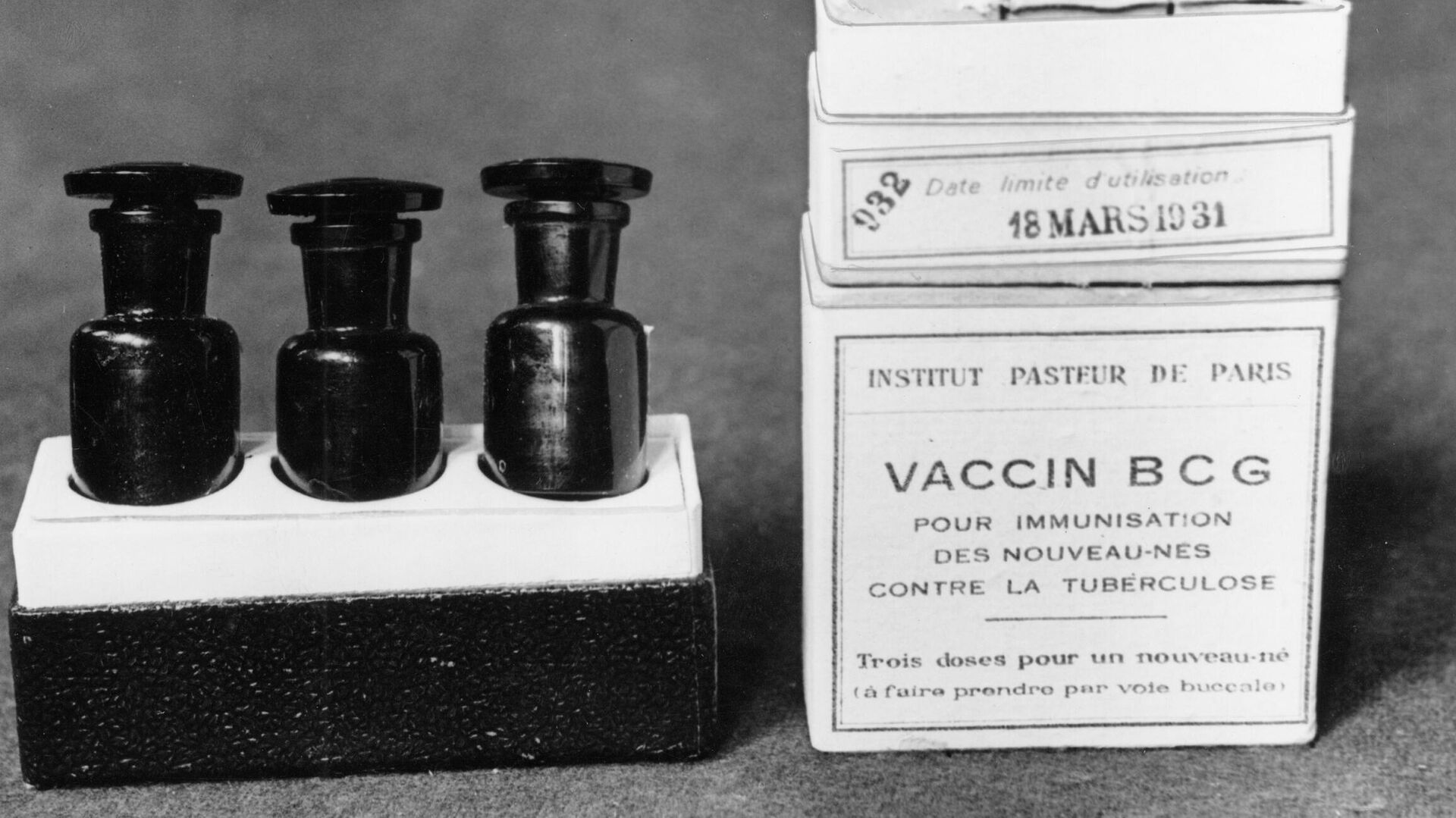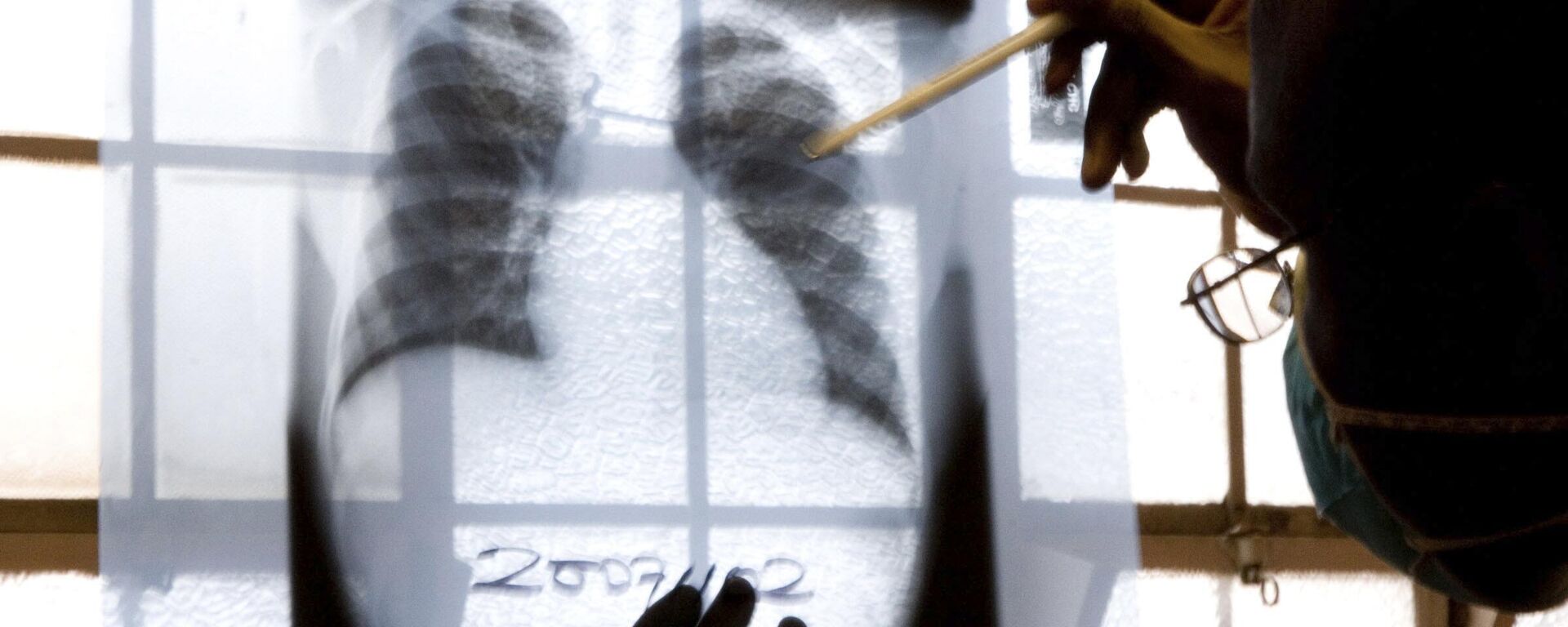https://en.sputniknews.africa/20240807/south-africa-achieves-breakthrough-in-new-tb-vaccine-what-are-the-benefits-1067761183.html
South Africa Achieves Breakthrough in New TB Vaccine: What Are the Benefits?
South Africa Achieves Breakthrough in New TB Vaccine: What Are the Benefits?
Sputnik Africa
Tuberculosis (TB) is the world's leading infectious disease killer, claiming 1.5 million lives annually despite being preventable and curable, according to the... 07.08.2024, Sputnik Africa
2024-08-07T18:33+0200
2024-08-07T18:33+0200
2024-08-07T18:45+0200
opinion
africa insight
world health organization (who)
southern africa
south africa
sputnik africa
tuberculosis
healthcare
health
vaccine
https://cdn1.img.sputniknews.africa/img/07e8/08/07/1067768729_0:749:2310:2048_1920x0_80_0_0_434e6d6c645e8030b303736403bb0526.jpg
A new breakthrough by South African scientists in modernizing the classic BCG vaccine against tuberculosis has the potential not only to reduce the disease transmission in communities, "which is really central to controlling the epidemic," but also to help in the fight against other diseases, Dr. Bavesh Kana, Head of the Centre of Excellence for Biomedical TB Research, University of the Witwatersrand, told Sputnik Africa.Before we continue, let's understand a little about what the researchers' breakthrough is. Kana explained that our bodies recognize the vaccine by recognizing the molecular shapes on or inside the vaccine and then reacting to them with the immune system. And when a pathogen with a similar shape enters our body, the immune system is already familiar with it, which either allows us to not get sick at all or to have a milder form of the disease.Although the classic BCG vaccine, invented more than a hundred years ago, is still an excellent means of combating TB, its effectiveness decreases over time. And scientists from the Witwatersrand wanted to prolong its effectiveness. They discovered that the BCG vaccine had a chemical modification in its form that prevented one of the components of the immune response from being activated. They thought that if they could cut out this part, the immune response would be stronger. However, it turned out to be not so simple.Tuberculosis is a significant issue in South Africa, and to tackle it more efficiently, scientists are planning to utilize clinical isolates, which are widespread specifically in Southern Africa—a region with a heavy burden of tuberculosis and drug-resistant tuberculosis—in newly designed challenge experiments. The new development sounds very promising, but what about the safety? The researchers already have some data that shows that "the new vaccine is as safe as the parental BCG." Moreover, in order to mitigate any potential risks, the team does "extensive experimentation" on small animals, and if all goes well, it will move on to larger animals and then to small groups of adult humans.With regard to TB treatment, it is important to note that although South Africa has the world's largest HIV treatment program, with 5.4 million people on antiretroviral therapy out of a population of 60.4 million, the WHO reported that in 2022, no less than 54% of the estimated new TB cases and 57% of the 54,000 TB-related deaths were among people living with HIV. According to the researchers' preliminary data, the new vaccine shows the same efficacy in HIV-positive people.When can we expect the vaccine? Such developments take a lot of time, since it is crucial to check both the effectiveness and safety of the vaccine. The scientist shared with Sputnik Africa that in 2–3 years his team expects to start human trials, and if they are successful, it will be possible to discuss the introduction of the new TB vaccine into the national immunization calendar.
https://en.sputniknews.africa/20240331/almost-65-of-africans-dont-show-typical-signs-of-tb-which-means-disease-can-spread-silently-1065854902.html
southern africa
south africa
Sputnik Africa
feedback@sputniknews.com
+74956456601
MIA „Rossiya Segodnya“
2024
Christina Glazkova
https://cdn1.img.sputniknews.africa/img/07e7/0b/07/1063380906_0:0:673:674_100x100_80_0_0_79628b4d0cd9f29291a57aa13bbf9e7a.jpg
Christina Glazkova
https://cdn1.img.sputniknews.africa/img/07e7/0b/07/1063380906_0:0:673:674_100x100_80_0_0_79628b4d0cd9f29291a57aa13bbf9e7a.jpg
News
en_EN
Sputnik Africa
feedback@sputniknews.com
+74956456601
MIA „Rossiya Segodnya“
Sputnik Africa
feedback@sputniknews.com
+74956456601
MIA „Rossiya Segodnya“
Christina Glazkova
https://cdn1.img.sputniknews.africa/img/07e7/0b/07/1063380906_0:0:673:674_100x100_80_0_0_79628b4d0cd9f29291a57aa13bbf9e7a.jpg
africa insight, world health organization (who), southern africa, south africa, sputnik africa, tuberculosis, healthcare, health, vaccine, science, research, medicine, hiv/aids
africa insight, world health organization (who), southern africa, south africa, sputnik africa, tuberculosis, healthcare, health, vaccine, science, research, medicine, hiv/aids
South Africa Achieves Breakthrough in New TB Vaccine: What Are the Benefits?
18:33 07.08.2024 (Updated: 18:45 07.08.2024) Christina Glazkova
Writer / Editor
Tuberculosis (TB) is the world's leading infectious disease killer, claiming 1.5 million lives annually despite being preventable and curable, according to the World Health Organization. While South Africa has made notable progress in reducing TB incidence and mortality since 2010, the incidence remains high at 468 cases per 100,000 people in 2022.
A new breakthrough by South African scientists in modernizing the classic BCG
vaccine against tuberculosis has the potential not only to reduce the disease transmission in communities, "which is really central to controlling the epidemic," but also to help in the fight against other diseases,
Dr. Bavesh Kana, Head of the Centre of Excellence for Biomedical TB Research, University of the Witwatersrand, told
Sputnik Africa.
"For example, you can use BCG in bladder cancer too. [...] Usually what happens is that the BCG is installed in the bladder, and that gives some kind of reaction that is not worked out yet. That allows for the killing of residual tumor cells. BCG also has these nonspecific effects. They can protect people against other infections. And so we expect that the really more effective BCG will have very broad-reaching consequences," he explained.
Before we continue, let's understand a little about what the researchers' breakthrough is. Kana explained that our bodies recognize the vaccine by recognizing the molecular shapes on or inside the vaccine and then reacting to them with the
immune system. And when a pathogen with a similar shape enters our body, the immune system is already familiar with it, which either allows us to not get sick at all or to have a milder form of the disease.
Although the classic BCG vaccine, invented more than a hundred years ago, is still an excellent means of combating TB, its effectiveness decreases over time. And scientists from the Witwatersrand wanted to prolong its effectiveness. They discovered that the BCG vaccine had a chemical modification in its form that prevented one of the components of the immune response from being activated. They thought that if they could cut out this part, the immune response would be stronger. However, it turned out to be not so simple.
"The challenge we faced was that we had to work out the genetic basis that the vaccine had for adding this chemical modification. And then we had to use some kind of genetic manipulation to remove the genes responsible. And so we could do some comparative genomics, bioinformatics, and some lab experiments to work out the enzymes that add this little chemical modification. But then removing them was difficult. They appeared to be essential for the survival of the vaccine. And so when we tried removing them, you couldn't grow the BCG. So we had to use this CRISPR gene editing technology to actually dial down the gene expression of these two genes. And then, we got a new version of the BCG vaccine that appeared more protective," the doctor explained.
Tuberculosis is a significant issue in
South Africa, and to tackle it more efficiently, scientists are planning to utilize clinical isolates, which are widespread specifically in Southern Africa—a region with a heavy burden of tuberculosis and drug-resistant tuberculosis—in newly designed challenge experiments.
The new development sounds very promising, but what about the safety? The researchers already have some data that shows that "the new vaccine is as safe as the parental BCG." Moreover, in order to mitigate any potential risks, the team does "extensive experimentation" on small
animals, and if all goes well, it will move on to larger animals and then to small groups of adult humans.
"Now, the [fundamental] approach we've taken is to try to address issues around adverse effects. Because if you can make a vaccine like BCG more potent, you then have to administer perhaps less of it. And so perhaps that gives a reduction in adverse effects," Kana added.
With regard to TB treatment, it is important to note that although South Africa has the world's largest HIV treatment program, with 5.4 million people on antiretroviral therapy out of a population of 60.4 million, the WHO
reported that in 2022, no less than 54% of the estimated new TB cases and 57% of the 54,000 TB-related deaths were among people living with
HIV. According to the researchers' preliminary data, the new vaccine shows the same efficacy in HIV-positive people.
When can we expect the vaccine? Such developments take a lot of time, since it is crucial to check both the effectiveness and safety of the vaccine. The scientist shared with Sputnik Africa that in 2–3 years his team expects to start human trials, and if they are successful, it will be possible to discuss the introduction of the new TB vaccine into the national immunization calendar.



